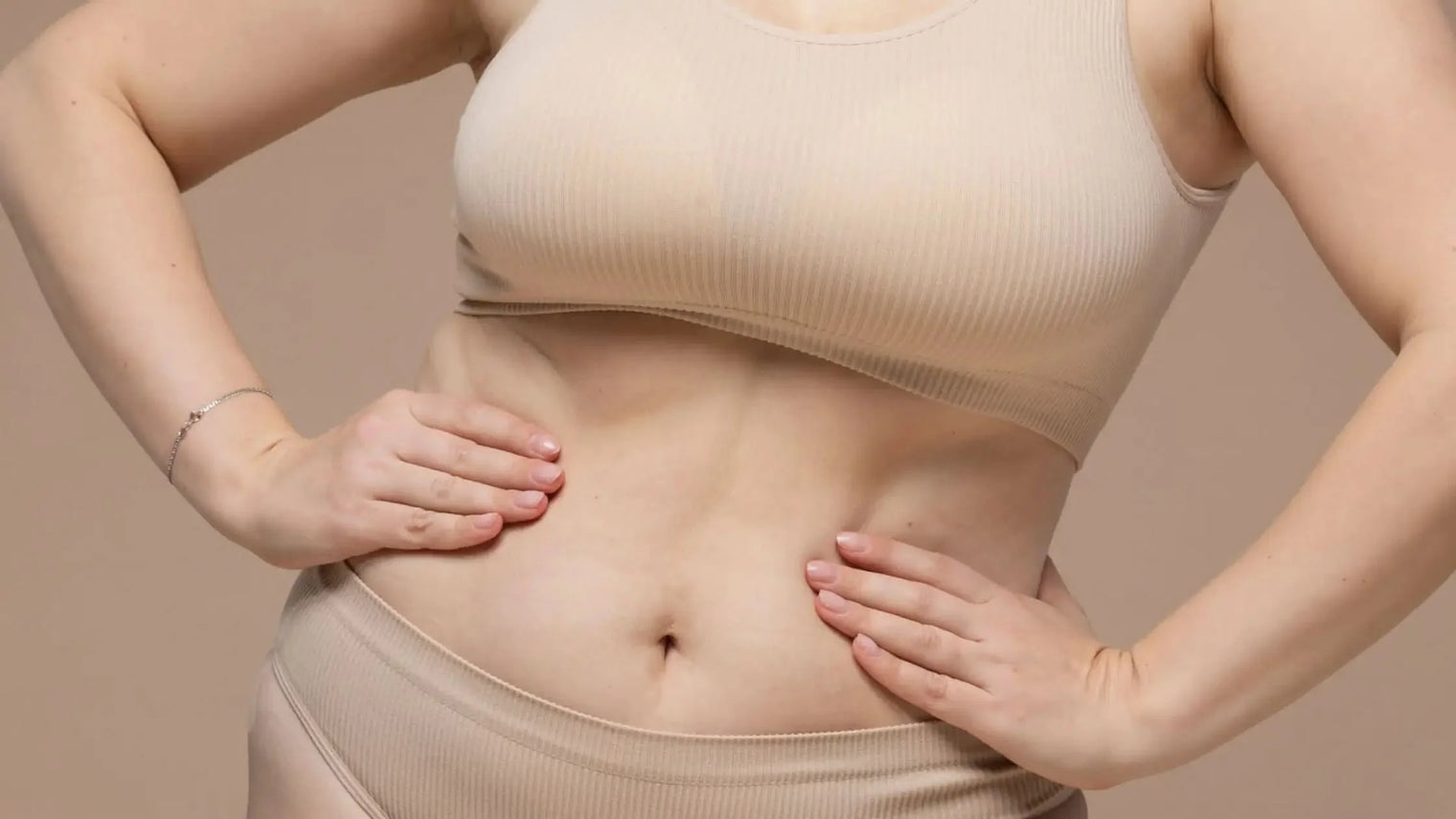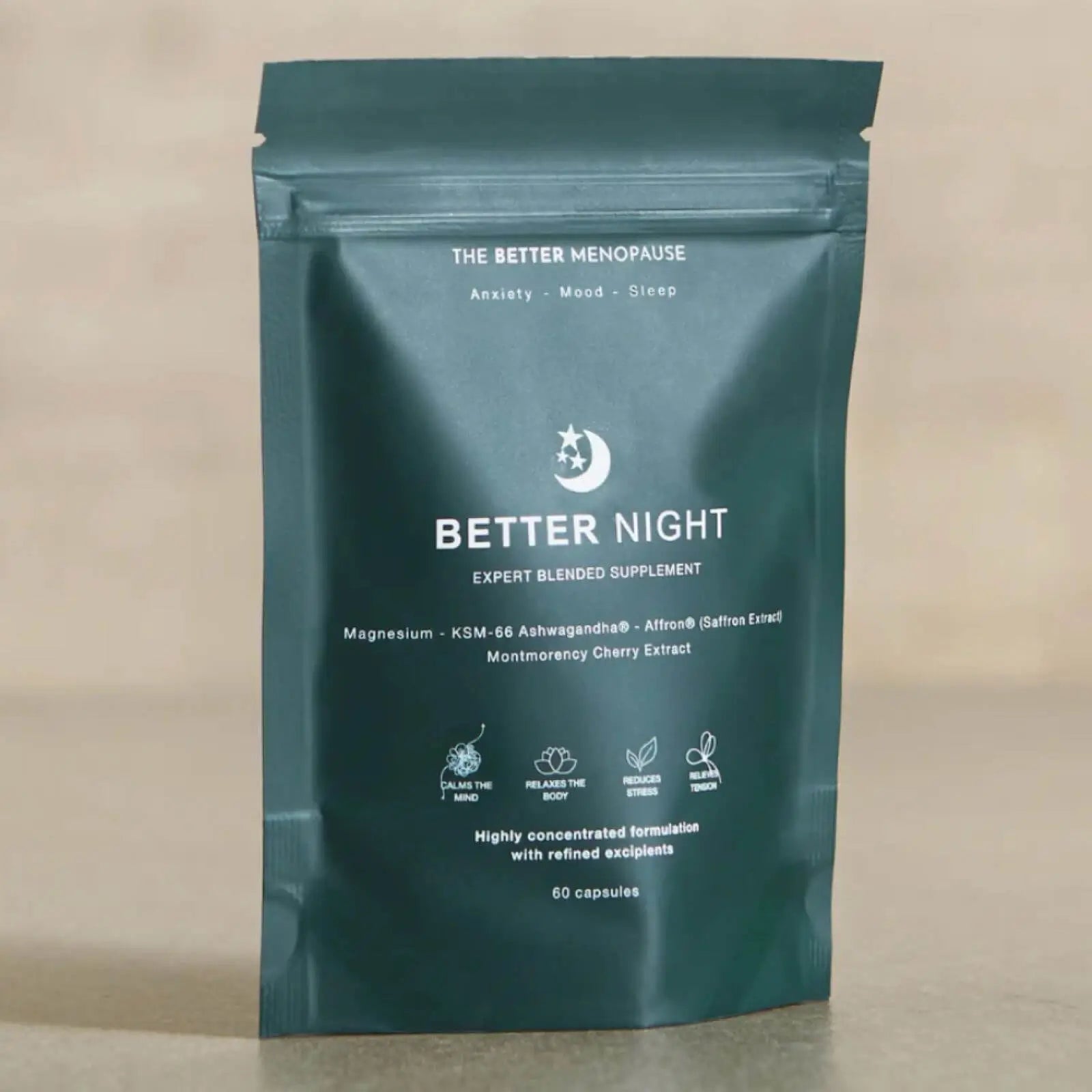
Supplements and natural remedies for menopause bloating
Assessing supplements, probiotics and natural remedies that may help with a bloated belly during menopause, plus tips for fast relief and gut health nutrition.
That bloated feeling in your belly is one of the more common symptoms of perimenopause and menopause. The good news is that, depending on what’s causing it, there are supplements and natural remedies that could help.
Magnesium supplements may reduce the fluid retention that can lead to bloating, while ginger and peppermint extracts can improve your digestion. In particular, scientific studies suggest that supplements containing certain strains of live probiotic bacteria can reduce bloating and constipation in menopausal women.
Below, we’ll look in more detail at these and other supplements. We’ll also provide some tips on how diet and lifestyle changes can improve your gut health and help to prevent bloating – plus, what you can do to get quick relief from the discomfort of bloating.
What causes menopause bloating?
As with many symptoms of perimenopause and menopause, fluctuating hormone levels are often the culprit. But there are several other possible causes of bloating that are also worth being aware of.
- Hormone changes: During perimenopause, the levels of your reproductive hormones can increase as well as drop. High oestrogen can lead to water retention, while raised progesterone levels can slow digestion – and both of these can cause bloating.
- Constipation: Although studies suggest that hormone changes don’t directly increase your chances of constipation, the stress and anxiety that often accompany this time can. This in turn can lead to increased gas and bloating.
- Food intolerances: Digestive issues including bloating are among the most prevalent symptoms of food intolerances. Lactose is one common intolerance but we’ll also look later at the potential impact of sugars known as FODMAPs.
- Supplements: While some supplements may help with bloating, others – including calcium and iron supplements – can actually cause it. Always talk to your doctor before you stop taking any supplements you’ve been prescribed.
- Medical conditions: Bloating during perimenopause or menopause is generally not a symptom of a serious health condition, yet it can be related to illnesses ranging from IBS to ovarian cancer.
Talk to your doctor if you feel bloated on a regular basis, or if you also have other symptoms, such as sickness, diarrhoea, weight loss, blood in your poo or a swelling or lump in your belly.
5 supplements and natural remedies to help ease menopause bloating
Here, we’ll look at what the science says about a range of supplements that may help with bloating.
Research has shown that certain probiotics can improve symptoms of bloating specifically during perimenopause and menopause.
Studies assessing other supplements suggest they may help with bloating during the menstrual cycle, which is likely to be caused by some of the same hormone changes.
Meanwhile, some remedies may work more generally for bloating related to digestive issues.
1. Magnesium
Magnesium is an essential mineral for your body, involved in everything from muscle and nerve function to regulating your blood pressure.
Although not much research has looked specifically at magnesium and menopausal bloating, studies have shown that a daily 200 milligram (mg) dose of magnesium can start to reduce premenstrual fluid retention and bloating after just a month.
2. Chasteberry
Chasteberry, also known by its Latin name angus castus, is a Mediterranean flowering shrub used in traditional medicine to help with women’s reproductive health.
Several studies suggest that supplements made with dried chasteberry fruit can improve a range of premenstrual syndrome (PMS) symptoms.
When it comes to reducing bloating itself, results vary. Some older studies found that chasteberry helped with other PMS symptoms but not bloating, but more recent research concluded that chasteberry did significantly reduce bloating after a single menstrual cycle and that this continued to improve for women who took chasteberry for their next two cycles.
3. Peppermint oil
The menthol in peppermint oil is an anti-spasmodic, meaning it helps your intestinal muscles to relax.
Researchers reviewing multiple scientific studies found that peppermint oil supplements significantly reduced abdominal pain and bloating for people with irritable bowel syndrome (IBS).
4. Ginger powder
Ginger’s reputation for improving digestion is well deserved so it could help if you tend to experience bloating mostly after eating.
Small studies involving supplements containing powdered ginger have shown that it can speed up the process of emptying your stomach of food, helping you to feel less full and reducing bloating and stomach pain.
Participants in these studies took ginger supplements totalling around 1,200 mg per day.
5. Probiotics
Probiotics are live bacteria that can improve the balance of your gut microbiome when you consume them. This can have significant benefits for both your gut health and your wider health.
Research has shown that specific strains of probiotic bacteria can improve bloating and related digestive issues:
- Lactobacillus acidophilus: reduces bloating and inflammation
- Bifidobacterium lactis: improves IBS symptoms
- Lactobacillus rhamnosus strains: improves IBS symptoms
- Bifidobacterium bifidum: reduces constipation and improves regularity
These strains are all combined in The Better Gut probiotic supplements, which also help manage a range of other menopause issues.
To find out more, visit The Better Gut. And for 10% off your first order, use the discount code WELCOME10.
Diet tips to improve gut health and reduce menopause bloating
Some supplements may help to reduce bloating, but what you eat is also crucial. Here are some science-backed tips for improving your gut health through nutrition:
- Eat a wide range of plants: Plants equal fibre and getting enough can help to prevent constipation and, in turn, bloating. Many plants also contain carbohydrates called prebiotics. These act as food for your gut microbes and may support the live bacteria in probiotic supplements. Because different plants contain different prebiotics, eating as wide a range as possible will help increase the diversity of your gut microbiome. Include colourful fruits and vegetables, beans and pulses, nuts and seeds, and whole grains.
- Add fermented foods to your diet: Fermented foods and drinks like sauerkraut, kimchi, kefir and kombucha contain live probiotic bacteria. Although these foods won’t provide the specific combination of strains for menopausal bloating found in The Better Gut probiotic supplements, they can improve your overall gut health by increasing the range of “good” microbes that make up your gut microbiome.
- Identify trigger foods: If you regularly experience bloating or other gastric issues, you may have problems digesting the sugars in some foods, like lactose in milk and FODMAPs in certain plants. FODMAP stands for Fermentable Oligo-, Di-, Mono-saccharides And Polyols, but many people only have a problem with one of these. Keeping a food diary can help you identify which foods trigger your symptoms.
- Eat less salt: Too much salt can contribute to water retention, which can leave you feeling bloated. To reduce the salt in your diet, limit the amount of ultra-processed foods you eat and use herbs and spices rather than salt to flavour the meals you make at home.
- Stay hydrated: It may sound counterintuitive but dehydration is another potential cause of water retention, and can also lead to constipation, both of which contribute to bloating. Drinking liquids regularly throughout the day can help you stay hydrated.
Other ways to stop bloating
If you’re looking for quick relief from bloating, there are some things that may help, including yoga and abdominal massage. There are also lifestyle changes you can make to reduce your risk of bloating and improve your overall health at the same time.
- Exercise: Studies suggest that just 20 minutes of aerobic exercise three times a week can reduce bloating in women with PMS. The NHS also recommends regular exercise to help with general symptoms of perimenopause and menopause.
- Yoga: Yoga teachers can recommend a range of different poses to help shift trapped wind and reduce bloating. Yoga also improves your general posture, which could be important as studies have shown that you pass gas much more quickly when sitting upright.
- Abdominal massage: The NHS recommends a range of abdominal massage techniques you can use on yourself that can not only relieve constipation and bloating but may also help with menstrual belly pain and cramps.
- Eating more slowly: Eating or drinking too fast can increase the amount of air you swallow, leading to a build-up of gas in your gut and a feeling of bloating. Chewing gum can have the same affect so you may want to avoid that too.
- Reducing fizzy drinks: You’re probably aware that the gas in fizzy drinks can lead to bloating. But scientists are looking at whether the added sugars and artificial sweeteners they often contain could also contribute to these symptoms.
- Stopping smoking: We’re all aware of the serious health implications of smoking but studies have shown that it’s also strongly linked to increased digestive issues, including abdominal pain, constipation and bloating.
Summary
Abdominal bloating during perimenopause and menopause is often the result of fluctuating hormones, which can lead to water retention and slowed digestion. However, bloating can also be caused by constipation, food intolerances and in some cases other health conditions.
If you have continuing issues, or other symptoms along with bloating, it’s a good idea to talk to your doctor.
Depending on what’s behind your bloating symptoms, certain supplements and natural remedies may help. There’s some evidence that chasteberry can improve pre-menstrual bloating, while magnesium may reduce water retention, and peppermint and ginger can aid digestion.
In particular, the unique range of bacteria in award-winning probiotic menopause supplement The Better Gut has been shown to help reduce bloating, constipation and inflammation and improve IBS symptoms.
Eating a healthy diet with a wide variety of plants and fermented foods, and exercising regularly, can also improve your gut health, while yoga and abdominal massage may provide some quick relief from bloating.
To find out more about how The Better Gut could help with your menopause symptoms – including bloating, hot flashes, brain fog, sleep quality and mood – visit the website.
And for regular tips on how to boost your health during perimenopause and menopause – and 10% off The Better Gut probiotic supplements – sign up for our newsletter.


